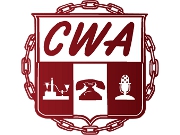CWA and T-Mobile workers fight to keep T-Mobile USA jobs

With 3,300 workers at risk of losing their jobs when T-Mobile USA closes seven call centers in June, Communications Workers of America launched a national campaign on April 16 to protect those jobs at a rally in Bellevue, outside corporate headquarters. Participants included CWA members and union and community supporters from the Seattle area. Also joining the rally were T-Mobile workers, including workers from the call centers that are slated to close.
Workers delivered a petition to T-Mobile CEO Philipp Humm with more than 100,000 signatures, calling on him to keep good call center jobs in the U.S. and instead bring back the 6,000 jobs the company has shipped overseas, including to the Philippines and Honduras. The delegation also called on T-Mobile to ensure that workers can freely choose union representation without fear of retaliation.
“I love my company, I love helping people, and I’ve been doing it for five and a half years,” said Roland Ellis, a T-Mobile worker from Nashville, Tennessee. “But we need a voice at work. I’m challenging T-Mobile to give us the opportunity to speak for ourselves and unite for better working conditions and better service for our customers.”
“Our state gave T-Mobile millions of dollars to create jobs and what did they do in return? They took the money and now they’re turning their backs on me, my co-workers and our whole community,” said Blake Poindexter, a T-Mobile worker from Frisco, Texas. “T-Mobile is putting profit ahead of its workers and costing thousands of workers their jobs.”
In four of the seven communities where call centers are slated to close (Frisco and Brownsville, Texas; Lenexa, Kansas; and Redmond, Oregon), T-Mobile USA received $14.2 million in taxpayer dollars from state and local economic development subsidies. CWA is working in communities where T-Mobile USA is shutting call centers to spotlight the company’s abuse of taxpayer dollars and its failed business plan.
Jamone Ross from Frisco said the call center “used to be a great place to work. It was very customer oriented. You could be very conversational with customers, and the customer actually felt like you were trying to help them out. But then it all became about stats, a numbers game.”
Then T-Mobile chopped the call center down to barely 400 workers, and eliminated a help line to support customers with questions about flip phones and other products, he said. T-Mobile only is providing two months of severance pay, and “it’s hard for families to pick up and move to another T-Mobile location,” he said.
CWA is also supporting the bipartisan federal U.S. Call Center Worker and Consumer Protection Act, which bars companies that send call center jobs overseas from receiving federal grants and tax breaks. The legislation currently has more than 110 House cosponsors. As part of its national T-Mobile USA campaign, CWA also is launching an online ad campaign to urge support for the call center bill and is working with elected officials to keep the seven call centers open.
The seven T-Mobile call centers set to close in June are: Allentown, Pa.; Fort Lauderdale, Fla.; Frisco, Texas; Brownsville, Texas; Thornton, Colo.; Redmond, Ore.; and Lenexa, Kansas.

